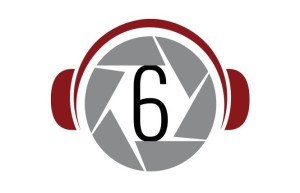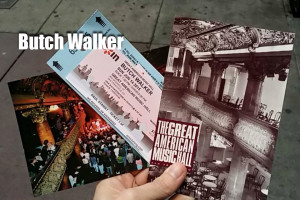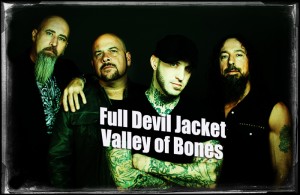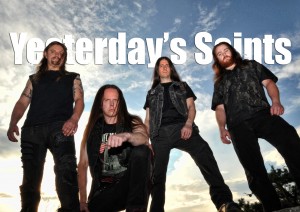A Dramatic Turn of Events: A Conversation with Dream Theater
17 min read
 For Dream Theater fans September 8th, 2010 was probably a day that none of them could foresee – Mike Portnoy leaves Dream Theater. For those that were paying attention, Mike had already been on a significant hiatus from the band as the fill-in drummer for the deceased “Rev” on Avenged Sevenfold’s then just released Nightmare album as well as the fill-in touring drummer scheduled to play with the band through the end of December 2010. For Dream Theater fans, it was a time of expressing a split between hating Avenged Sevenfold and the anticipation for Portnoy’s eventual return to Dream Theater. That was not meant to be. On September 8th shortly after meeting with his soon to be former band mates, Mike Portnoy released a statement on Facebook and other music outlets explaining that he was leaving the famous Prog Metal Band of which he was a founding member of twenty plus years in order to explore other opportunities. For many, this was like the shot heard around the world as all the headlines exploded to read, “Mike Portnoy Leaves Dream Theater.” While fans were left bewildered and wondering what was next for both Mike Portnoy and Dream Theater the answer for the remaining members of Dream Theater was obvious – find a new drummer. The not so obvious part was finding out who, if anyone, could actually fill the shoes of a Prog legend. The band and record label would make the search public in a three part series released on the internet in search of their new drummer entitled “The Spirit Carries On” before finally deciding upon veteran Mike Mangini (former drummer for Extreme and touring drummer for Steve Vai). If anyone had the kind of charisma and presence required to fill the shoes of one of music’s top ranked drummers, Mike Mangini would be a good choice to be sure. However a year removed from Portnoy’s departure the questions still remain. Could Portnoy be replaced? Would Mike Mangini’s style resonate with fans when the album was finally released and would his personality be allowed to be unleashed during the shows? Or would Mike Mangini simply prove to be the able fill-in himself in the same way that Portnoy proved to be with Avenged Sevenfold? Upon closer examination both drummers walked into similar situations replacing someone else and were expected to seamlessly represent and play an original idea created by someone else. No more. No less. This is ironic, all things considered and how the two stories of Mike replacing Mike continues to play itself out. It’s also a question that remains as Dream Theater begins their tour for A Dramatic Turn of Events – an apt title for a band that doesn’t seem to be looking back with its new member in tow. If nothing else, this new phase of their careers now hangs in the balance of something that is nothing less than a dramatic turn.
For Dream Theater fans September 8th, 2010 was probably a day that none of them could foresee – Mike Portnoy leaves Dream Theater. For those that were paying attention, Mike had already been on a significant hiatus from the band as the fill-in drummer for the deceased “Rev” on Avenged Sevenfold’s then just released Nightmare album as well as the fill-in touring drummer scheduled to play with the band through the end of December 2010. For Dream Theater fans, it was a time of expressing a split between hating Avenged Sevenfold and the anticipation for Portnoy’s eventual return to Dream Theater. That was not meant to be. On September 8th shortly after meeting with his soon to be former band mates, Mike Portnoy released a statement on Facebook and other music outlets explaining that he was leaving the famous Prog Metal Band of which he was a founding member of twenty plus years in order to explore other opportunities. For many, this was like the shot heard around the world as all the headlines exploded to read, “Mike Portnoy Leaves Dream Theater.” While fans were left bewildered and wondering what was next for both Mike Portnoy and Dream Theater the answer for the remaining members of Dream Theater was obvious – find a new drummer. The not so obvious part was finding out who, if anyone, could actually fill the shoes of a Prog legend. The band and record label would make the search public in a three part series released on the internet in search of their new drummer entitled “The Spirit Carries On” before finally deciding upon veteran Mike Mangini (former drummer for Extreme and touring drummer for Steve Vai). If anyone had the kind of charisma and presence required to fill the shoes of one of music’s top ranked drummers, Mike Mangini would be a good choice to be sure. However a year removed from Portnoy’s departure the questions still remain. Could Portnoy be replaced? Would Mike Mangini’s style resonate with fans when the album was finally released and would his personality be allowed to be unleashed during the shows? Or would Mike Mangini simply prove to be the able fill-in himself in the same way that Portnoy proved to be with Avenged Sevenfold? Upon closer examination both drummers walked into similar situations replacing someone else and were expected to seamlessly represent and play an original idea created by someone else. No more. No less. This is ironic, all things considered and how the two stories of Mike replacing Mike continues to play itself out. It’s also a question that remains as Dream Theater begins their tour for A Dramatic Turn of Events – an apt title for a band that doesn’t seem to be looking back with its new member in tow. If nothing else, this new phase of their careers now hangs in the balance of something that is nothing less than a dramatic turn.
I recently got to speak to Jordan Rudess of Dream Theater in order to get a fuller idea of what happened behind the scenes from their perspective as well as what the future holds for these giants of Prog. What I found out was both enlightening, entertaining and not to mention telling of the band’s steadfast desire to keep churning out music that Dream Theater fans have grown to love and expect. Check out our conversation with this synth virtuoso as we talk about all things Dream Theater both old and new.
Jordan Rudess: Hey, this is Jordan Rudess from Dream Theater.
C6M: Hey Jordan, thanks for calling.
Jordan Rudess: No problem. How’s it going?
C6M: It’s going well. Okay, so I listened to the new album, really like it, can’t wait to talk about it, but I wanted to rewind a little and go back over the last year or so and talk about what you guys have gone through in terms of parting ways with a founding member and then going there from the whole thing to a somewhat of a public audition for a new drummer and to where you are now, is that okay?
Jordan Rudess: Sure, no problem.
C6M: So, there are a few things that I wanted to ask about how the whole Mike Portnoy thing went down from your guys’ perspective. I mean were you guys shocked by his departure?
Jordan Rudess: Yes. I was really surprised. I thought that — I thought I was going to be walking into a meeting where we were going to simply talk about where and when we were going to record. I didn’t think there was even a real possibility of that not happening, although maybe if I thought about it from a different perspective, I might have, you know, had that idea. But yeah, we were all ready to go — we were all ready to begin the discussion and Mike kind of like said, “Hey, before you start, you know, I just want to tell you guys kind of where I’m at.” And he spelled it out for us, and you know, basically what he said is he wanted to take a five year hiatus, he thought that — he felt like things were not — you know, that’s great for him, and he thought that giving the band a long break like that, we’d come back and we’d have this glorious reunion, and it would be amazing, it’d sell all kinds of tickets, and the band would be refreshed. That perspective kind of blew all our minds, because none of us were on the same page, the other four members of the group. Basically our jaws collectively dropped to the floor and we were kind of like, “Uh, what?” Like you know, he has his own thoughts and if you follow his career, you can see he’s been doing so many different things, millions of things, very involved with the — he was very involved with Avenged Sevenfold, and really on a — you know, on his own very individual path in life, so you know, when I think back on it, then I can go, “Oh well, okay, I get it now,” you know, that’s what he is, and also a little hard for me to personally understand, I guess, because you know, I’ve been with this band for 13 years, it’s a long time, but he was with this band for over 20 years, so I mean I can only put myself in his shoes to a point, you know.
C6M: Sure, — from an outsider’s perspective, it seemed like the band itself, at least as far as I could tell from just watching everybody else play, they all seemed to have room enough to do solo projects, so it didn’t seem that strange that he was contributing to an Avenged Sevenfold and then doing his Transatlantic thing, when other members of the band were doing Platypus or touring with Steve Vai or doing something like that.
Jordan Rudess: Yeah, right. I mean he was — lately he’s been kind of like the busiest one, doing all kinds of stuff, but then you know, he has that kind of personality too, where he just likes to keep himself really, really busy, and you know, it’s the — that’s just where he’s coming from.
C6M: Right. So, how hard was it to sort of regroup and then figure out what was the obvious next step? I mean was it super easy or was it — did you guys need some time to sort of regroup or how did that work in terms of going and figuring that out?
Jordan Rudess: Well, I think what helped us a lot in this situation is that we all really were sure pretty much from the moment that this occurred, that we wanted to continue making music together. There was no question that we wanted to go on as Dream Theater and just do what we do. I mean to us it was like a no-brainer, that everyone said “Are you okay? You know that’s fine, we’re not going to stop. You know, this is a business, we worked hard on it for many, many years.” So, with that kind of certainty, that kind of assured us that we could move forward. And at that point it was a matter of trying to make some really good decisions about how to move forward. I mean that’s not to say that after this went down that there wasn’t a great deal of — kind of — emotional pain. It was really a blow to lose your drummer and friend of so many years. It was like “Okay, you know, like wow, let’s think about this, what the hell is going to happen here?” So, but the fact that we knew we wanted to make music was you know, one step at a time. We were kind of like, okay, well this is music, it’s a band, we can figure this out and we can find a drummer first of all. And you know, that was one of the first things we had to decide how we were going to do. So, that’s what we did, and we planned — you know, we figured. We realized pretty quickly that we could have a choice of some of the world’s greatest drummers. So, all of a sudden we felt like “Wow, okay, so maybe this will work out.”
C6M: I thought it was really interesting though, as you both parted ways, that you both sort of used that same theme of the spirit carries on. Him and his sort of resignation letter that went public, and then your theme, that you guys sort of chose as you were — as it was represented on that Roadrunner released video documenting the process of finding your new drummer, that you both used that term, that the spirit carries on, and I thought that was interesting. Was that intentional, was that something that was like you know, hey, this is something that we all believe, even though we’re going our separate directions, that we carry on the spirit of whatever this is being — musicians being creative types and doing this?
Jordan Rudess: I think it was just something that works for us, because of the fact that we have a song that’s titled that, and there’s this almost a natural way to fall into that. I don’t — there’s nothing more than that really.
C6M: So, as you went through that whole process of finding the new drummer, I noticed that it seemed that you had — yeah, like you were saying before I interrupted you, you had your choice of some really top tier talent. What was the hardest thing in going through that process? I mean I know, you put them all through a very strenuous test of three steps…
Jordan Rudess: Yeah, let’s see, well, one of the kind of cool things is that we were lucky enough that we — I guess because of the taste that we did it. We made, I think, some really good decisions. And one of the things that was smart of us was to really figure out how to have a meaningful audition rather than just having somebody come in and maybe run through a few songs and you know, do whatever. We really planned it, like what do we need to see from these people, and that whole little process that everybody saw on the documentary, where we divided it into basically three parts, was so great, because it really showed us what we needed to know, got us in deep with whoever it was, and we ended up having each audition be pretty complete and you know, the information was clear about each guy. And basically that was just you know, finding out how they played our songs, and then therefore how we felt with them what we were playing, how they absorbed new ideas, because obviously we do a lot of writing and the material is hard, and we want to know what their contribution could be when exposed to some interesting rhythmic or musical idea, and lastly how they improvised, because a lot of ideas would come out of an improvisation. So, yeah, so we put all of those drummers through the — that kind of test, if you will, and obviously Mike Mangini is the one that we chose, and he was — you know, it’s not that the other drummers were amazing. You know, all of them really were. This was more like a casting call, so once you provided us with the three different elements of the audition and did those well, then it was more about like, “Okay, well, who are you, where are you coming from? How much do you want this job, what’s your commitment level?” You know, many different factors go into walking in taking part in a play or something.
C6M: Right. Was there any one factor that weighed more heavily than the others or was it simply like you went through it and then you said he just incorporates everything?
Jordan Rudess: Yeah, well, Mike got the job because he came in basically saying that — presenting himself as being totally like in sync with the situation, like — kind of like “This job is just meant to happen for me. Everything I’ve done to this point has led me to this point, and it’s perfect for my life, and I’m so into it, and I really want to do it, and I’d be totally committed to it,” you know, that kind of sure, positive, forward energy about it, combined with the fact that he came in and nailed every song, played it perfectly and excelled in all of the other parts of the audition. We had some personal connections with him already through things like James playing on his — I mean through him playing on James’ solo albums. You know, we all knew him from meeting him through the years, and we liked him, so there was enough, you know, kind of checks in that category and pluses that it really made sense. We thought like he was coming from a similar place. So, that was cool.
C6M: It’s really interesting, because I mean if you were to like trace his career though, and that’s where — at least from the outside looking, and it’s where I find it the most interesting, is that — you know, he comes from a background of bands that are stylistically super different than Dream Theater. He came from Extreme and played with Gary Cherone’s other project Tribe of Judah where it’s almost like this industrial music, and then this funk metal style, and then coming into Dream Theater — not that he’s not a great drummer, because I’ve seen him play in the past, and just an amazing thing. So, was that part surprising that he came in and sort of owned it like he did?
Jordan Rudess: No, because as I said, he played with — on James’ album, he’s played with Steve Vai, and that’s some heavy duty crazy instrumental music, and you know, there’s enough similarities in all the things that he’s done. I wasn’t surprised on that level. It wasn’t like wow. I knew he was an awesome drummer, I’d seen him with Vai years ago, so the fact that he came in and just kind of nailed it, it was like “Wow, he’s great, awesome.”
C6M: So, is there a room for him to put on the crash helmet and do his crazy thing in the middle of the shows?
Jordan Rudess: He’s been doing a — he’s been soloing every night, and it’s really blowing some minds. You know, he’s exceptional.
C6M: That’s awesome. So, how do you guys feel about the new album — like I said, I got to hear it, and it’s really kind of interesting that it almost doesn’t really feel that much different. It’s definitely a Dream Theater album in terms of the direction that you guys have gone. There’s a few — I think it was the second song on the album that is only a little different than what I’m used to in terms of what you guys do.
Jordan Rudess: Yeah, right.
C6M: But other than that, it’s almost seamless. Did you really have to sort of recreate yourselves in the studio or was it just like plug and play?
Jordan Rudess: Well, I think people have all different perceptions about the reality of what — of the way Dream Theater’s music came together. It’s a little bit hard for anybody to really get an absolute grasp of what goes into it, and so that’s part of — I guess that’s part of the reason that people were wondering what’s going to happen, because I mean Mike was very much the face of Dream Theater as far as the press goes. He would do so many interviews and people thought, “Okay, well, Mike Portnoy is obviously like a main composer here, and when he leaves, things are really going to change.” But one of the things that happened — and not to take anything away from Mike Portnoy, he’s an extremely talented, capable human being, but when he left the band, one of the things that we weren’t concerned about at all was writing the music, because John Petrucci and I, we are the ones who are writing the notes really, I mean the harmonies and melodies, and Mike was very involved, but he was more involved from a director, producer point of view in the compositions and directing melodies, but John and I are completely capable to write music. That was the concern that was — you know, if anything, that type of concern was more about like “Okay, well, Mike’s not here, so now people can kind of get to see that — if we can write,” but you know, we’re perfectly capable to write the music. There really is a real misconception where people think that Mike Portnoy was the main songwriter in Dream Theater, and that’s not true.
C6M: Right, so that’s…
Jordan Rudess: Very involved, very talented, and you know, a great musician, but you know, you got to…
C6M: Sure, so it was more…
Jordan Rudess: Understand maybe a little — people just maybe will be introduced to more of a reality by looking at this album and saying, “Hey, he’s not on it,” you know, like it’s “Wow, they wrote Dream Theater music, and Mike Portnoy is not even on it, oh my God.”
C6M: Right and it is sort of funny because that is the — I guess like I said — I was mentioning, it was a little bit of a surprise — I was happily surprised that it sounded so good, and you know, it was to me sort of, like I said, a seamless thing. I mean you could tell some of the differences in the drumming styles, but not much. I mean it seemed like Mike was doing exactly what you guys wanted him to do.
Jordan Rudess: Yeah, well, yeah. I mean one of the things that Mike Portnoy did in the studio is he obviously was right there, and he was good at like if we play a riff or something, like Mike would say “Oh, keep playing that,” and he would find an interesting way to turn it around, and it would really come from his mind, and you know, be a drum creation. In this sense we didn’t so much have that, we had — John and I, with the help of the other guys, wrote this music, and we would take the ideas and then present them to Mike Mangini and he would then create his drum part from what we would present to him. So, you know, maybe in the future we’ll do it a little bit differently, but in this case, you know, the accents and the nature of the composition was just presented to him, and then he had to play on those songs. So, there was a difference in how much drum composition went into this album.
C6M: Well, how under the gun did you guys feel? I mean was there a timeline, like an established timeline that you guys needed to write this album in so much time and get it out as quickly as possible given everything (that happened)?
Jordan Rudess: You know, kind of yeah. It’s the usual kind of thing, you know, we’d be in the studio for a while and put it out, you know, we couldn’t just sit around just doing nothing, we had to get the album done this year and put it out and be ready to tour. So, you know, it wasn’t like we said exactly this many weeks or this many months. We could go, you know, a month beyond normal if we needed to, and I don’t remember exactly how long it took, but we were productive and once we got — the only thing that — the thing that made us a little bit, what’s the right word, concerned is that this was an album where all eyes were going to be upon us, you know, like “What are we going to do, you know in this situation? What are we going to come up with?” You know, again, we knew that it’s almost like business as usual, we just keep writing music and we’ll be fine, but we knew there was this extra pressure of “Okay, everybody is really, really watching now, they want to know.” So, you know, John and I felt like, you know, this had to be really, really our very best compositional work, and so we — you know we keep kind of — that’s what we knew. That was the pressure that we just wanted it to be really, really special.
C6M: Indeed, indeed it is, it really is, and I think it’s up there as I think one of my favorite ones. I’ve only listened to it probably for a week now at the most, but I thoroughly enjoyed it. It’s sort of been in my rotation of music, so definitely, definitely pleased. So, what’s next, where are you guys playing?
Jordan Rudess: So, right now we’re kind of at the beginning of our touring cycle, and we’ve got another few weeks around the US to do, and then after that we’ll be touring in December some more shows, in January, we’re going to go back to Europe, and then we’ll probably do — filling the rest of the countries that we want to go to after that. And that’s pretty much what the rest of this year and next year has in store for us.
C6M: Right, tour, tour, tour, right. Awesome, well, thank you so much for taking the time out of your day. I know they kind of squeezed me in there, but I very much appreciate you taking the time to do this.
Jordan Rudess: No problem.
C6M: Yeah, like I said, enjoyed the album and wish you guys all the best on the tour.
Jordan Rudess: Thank you so much, and thanks for your support, I appreciate that.
C6M: Thank you.
Jordan Rudess: Okay man, great. Alright, have a nice night, okay.
C6M: You too, bye.
Special thanks to Jordan Rudess of Dream Theater for taking the time to talk to us. If you haven’t picked upA Dramatic Turn of Events you should check it out. If you haven’t seen the series that Road Runner released searching for the new drummer you can watch that here. Both the album and the documentary give you an idea about the direction in which they intend to go as they forge ahead in the new era without Mike Portnoy. Only time will tell what the next chapter brings from these guys, but if their longevity and proves anything else as the reigning Kings of Prog Metal it’s that they don’t intend to give up their throne any time soon.






